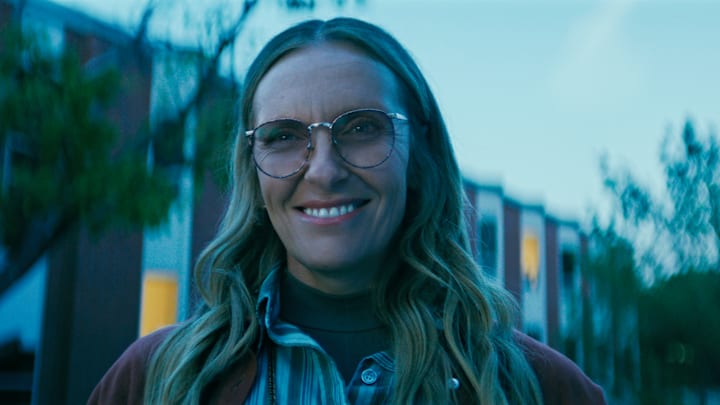In the pines, in the pines, in the tall and lonely pines…
The haunting melody of this folk song threads through Netflix’s latest miniseries Wayward. The 8-episode series is an eerie exploration of the troubled teen industry and what happens when an entire town comes under the spell of one woman (who else but Toni Collette?)
Wayward’s two main storylines are that of Leila and Abbie, Canadian 10th graders with a penchant for getting into trouble, and that of Laura and Alex, a couple returning to Laura’s childhood home to have their baby. As the story unfolds, we learn that Abbie’s perfect family is viciously perfectionistic, and Leila is reeling from the trauma of her sister’s death.
Laura, too, has a past she speaks little about. In fact, she was a graduate from the Tall Pines Academy, crediting it with setting her life straight. When her husband joins the police force in Tall Pines, he gets the persistent feeling something isn’t right in the town. Where are all the children? Why did the teenager who escaped the academy look like he was running for his life? And who is this woman his wife is so obsessed with?
Enter Evelyn, the founder and leader of the academy. Toni Collette transfixes audiences with her strange, new-agey mannerism. Her ability to burrow inside each character’s head is uncanny, as are her therapeutic methods. In the game “hot seat,” for instance, one child sits in the center of a circle of chairs while the others shout insults at them, intentionally striking at the issues closest to their hearts. Honesty, Evelyn posits, will heal them.
While Leila and Abbie try to escape, and Alex attempts to protect his family, Laura begins to remember her past. Why, for example, can she not connect to the child in her womb? Why does she wake up standing in the middle of a pond? What really happened to her at Tall Pines, all those years ago?
Wayward lays bare the damage – sometimes irreparable, sometimes even fatal – that the troubled teen industry did to many people. It’s the first piece of mainstream media to truly dig into the concept, and it doesn’t shy away from brutality. The unique heartbreaks of Daniel’s story and that of Riley or even the despised Stacey, are all too real. Mae Martin’s inspiration was their longtime friend Nicole Simons, who attended one such institution and was a consultant on the show.
The story is atmospheric, and all the characters are messy, dimensional, and intriguing. Netflix seems to have eased up on the ‘80s nostalgia, because Wayward is as gratuitously ‘00s as it gets. (That this is a nostalgia trip is terrifying to millennials for totally different reasons…) From portable CD players to pop culture references, the whole thing is a love letter to the aught years.
A few ends don’t tie up quite satisfactorily (I need to know what happens to Leila), but ultimately, the miniseries has a realistic, if somewhat heartbreaking, coda.
While it was marketed as a standalone series, Collette and Martin are both keen for a second season, so fingers crossed we get to return to Tall Pines.
